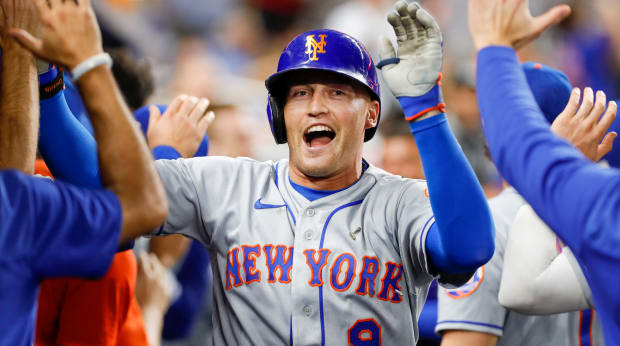The Mets stepped out of the headlines for, oh, 72 hours. After making a huge splash by signing Justin Verlander, they were thoughtful enough to recede into the background so the spotlight could shine on big moves by the Phillies and Padres, if only briefly.
And then Billy Eppler & Co. got busy again: New York reportedly signed outfielder Brandon Nimmo and reliever David Robertson in the space of just a few minutes on Thursday night. (They’d also signed lefty starter José Quintana to a two-year deal in the background of the action on Wednesday.) The Mets’ payroll was already the biggest in MLB. These signings ensure it will stay that way—and increase the team’s chances of being able to keep their footing at the top of a tough NL East.
Nimmo has spent his entire career with the Mets since being drafted by the team in the first round in 2011. The new deal will keep him in New York for what is likely the rest of his career: $162 million over eight years. That’s a considerably longer contract than most expected to see him sign. But this winter didn’t offer very much on the market in terms of outfielders—especially not in terms of those who can stick in center—and that worked in his favor. It’s another example this winter of a team choosing to add years to a deal rather than simply increasing the average annual value. And it’s worth noting that the most notable piece of Nimmo’s skillset is one that tends to age exceptionally well: his ability to get on base.
Watch the Mets with fuboTV. Start your free trial today.
Nimmo is among the best in the league when it comes to working a walk: Just 10 players have posted a BB% higher than his 13.9% since 2017. There are very few hitters who have displayed that kind of plate discipline so consistently. Among players who appeared in at least 500 games from ‘17 to ‘22, there are only six who beat Nimmo’s on-base percentage of .387, and all are bona fide stars. The group comprises Mike Trout, Juan Soto, Freddie Freeman, Aaron Judge, Bryce Harper and Joey Votto: That’s how good Nimmo’s on-base skills are.

Sam Navarro/USA TODAY Sports
Though he’s coming off a full season of good health, Nimmo’s had a few struggles there in the past, notably with a troublesome neck injury that kept him out for much of 2019. But the Mets know Nimmo’s medicals better than any other team, and they were obviously comfortable with this kind of serious, long-term commitment. Don’t expect him to stay in center field for the duration of this deal—though he now grades out as an average defender there after improving at the position—but the duration of the deal isn’t really the point. It’s what he offers right now. In a market with few strong outfield choices, in an offseason where they had to act to stay competitive, the Mets got to keep a key part of their lineup in Nimmo.
Robertson, meanwhile, signed for one year and $10 million. That’s a nice pickup: He bounced back very well last year after barely playing in the three preceding seasons due to injury. (He missed most of 2019 with an elbow problem and all of ’20 and most of ’21 with Tommy John surgery.) After an outstanding first half with the Cubs, the righty was picked up at the deadline by the Phillies, and he became a key part of their success down the stretch. Even though he slipped a bit towards the end of the season, his year still represented a serious comeback, considering how long he’d been sidelined. At his age—Robertson turns 38 in April—anything longer than one year wouldn’t make too much sense. But for just one season, at this price, it’s a smart move.
Yet even with all this spending … the Mets could do even more. The Braves and Phillies offer stiff competition, and if the club is already comfortable blowing past the highest level of the competitive-balance tax, well, they might as well stock up a bit more. There’s no such thing as too much pitching depth, and while they’ve made a dent there with Verlander, Quintana and Robertson, they’d benefit from another mid-rotation starter and perhaps one more reliever (especially a lefty). Team owner Steve Cohen’s wallet is open. If he wants to be competitive not just in the division, but in a deep playoff run, he might as well keep it that way for just a bit longer.






